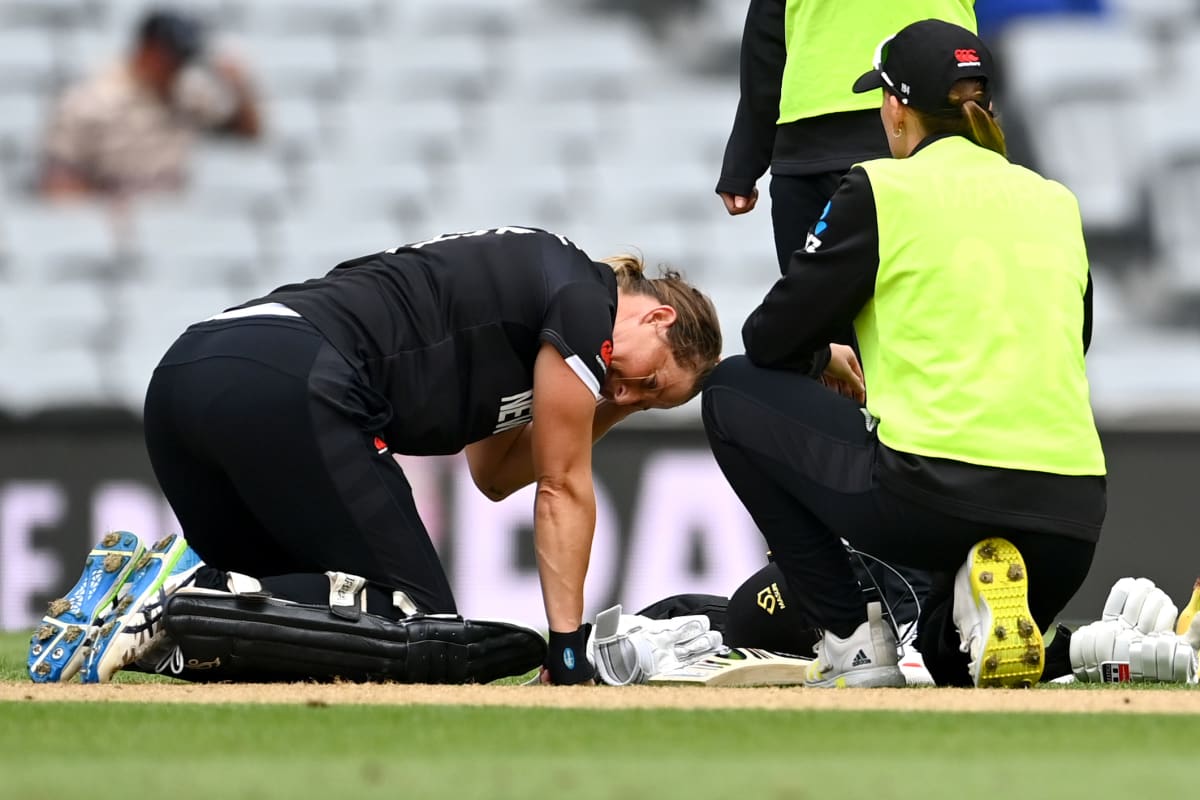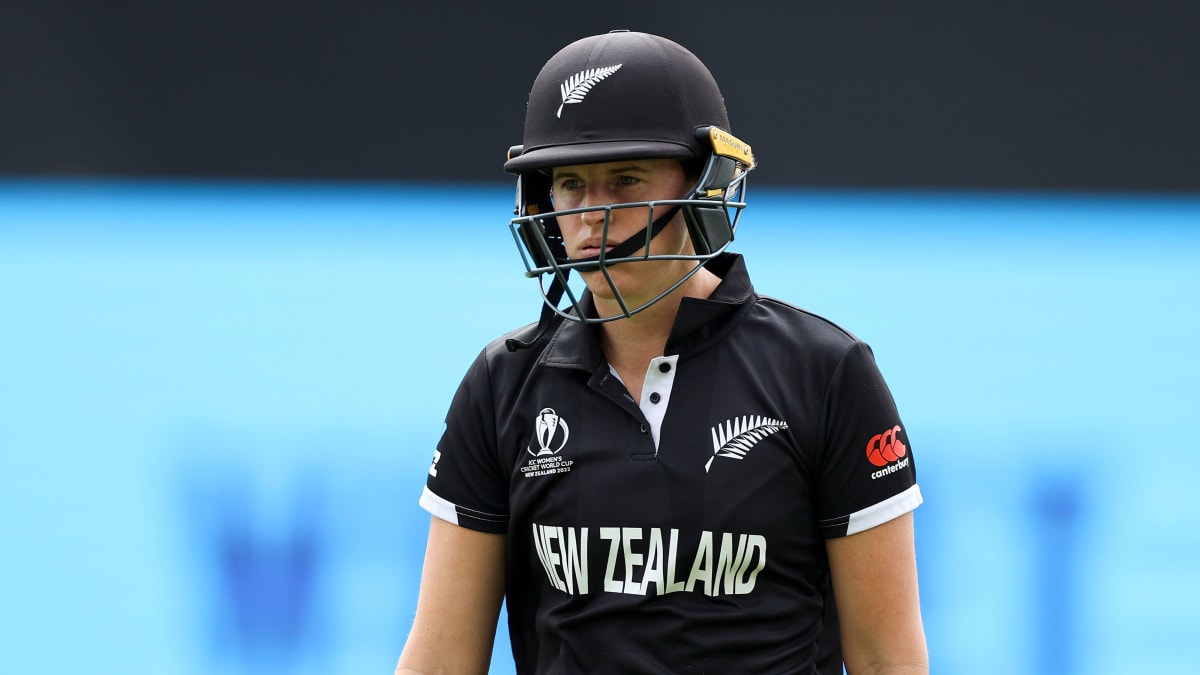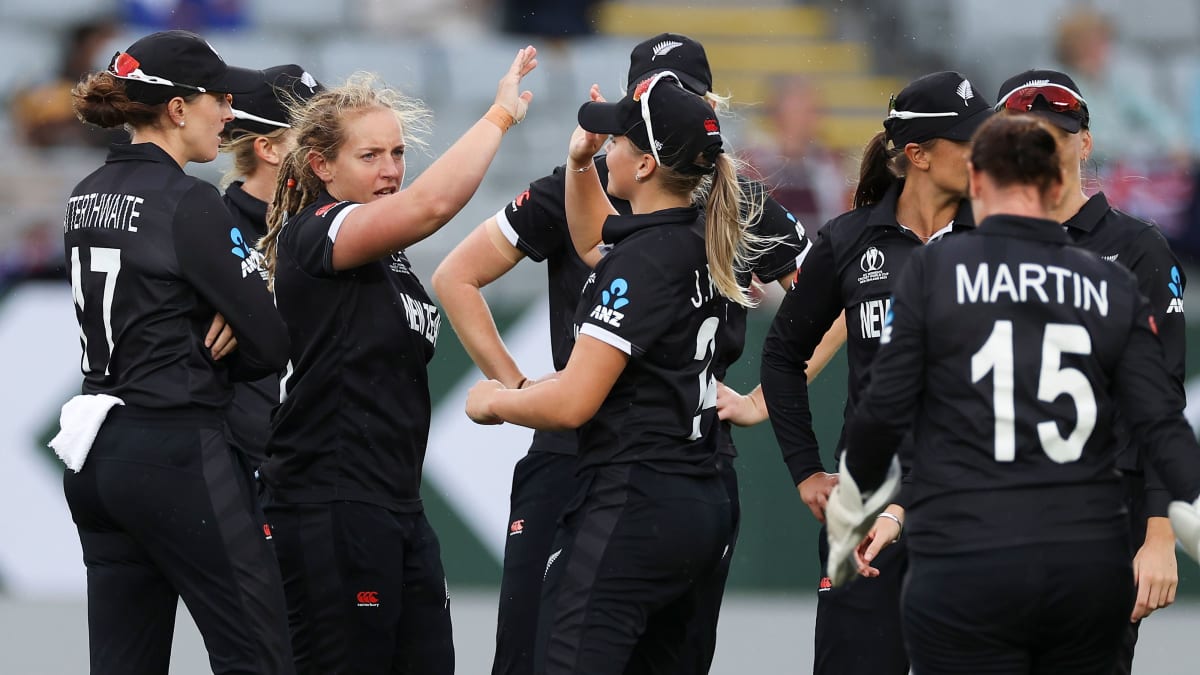
A devastated White Ferns have handed their World Cup fate to others, but know their chances of sneaking into the top four are slim. It's with the bat they've let themselves down, Suzanne McFadden writes.
After almost all of the crowd had filed out of Eden Park, wrapped in puffer jackets against a blustery and biting wind, the White Ferns lined up before the stragglers who remained.
It was kind of like visiting time in an American prison TV drama. The cricketers, looking a little downcast and not knowing what to do with their hands, stood in front of those few who'd waited - their family and friends.
They couldn't reach out for a consoling hug or pat on the back in this Covid age - as shattered as they were at losing to England by a mere wicket, and with it watching their plan to win the Cricket World Cup all but dissolve in the drifting rain.
Instead they painfully stayed within their World Cup bubble and trudged back to the changing room where the mood was one of devastation, as stand-in captain Amy Satterthwaite described it.
“There are some pretty devastated human beings in that changing room at the moment… irrelevant of age or experience," Satterthwaite said, away from the team.
“We are such a tight-knit group and we really believe in each other. Everyone has come such a long way and done a lot of hard work over the last 12 to 18 months. And we genuinely thought we could compete with the top teams and win games of cricket here.”
Instead, they struggled to close out clashes they should have won - where, in a tournament of the world's top eight nations, every win counts. Yesterday's loss - their fourth from six games - took with it any real chance the White Ferns had of progressing to the semifinals of their home tournament.
It was the ninth down-to-the-wire finish in this World Cup - and the third for the White Ferns. Which is, of course, incredible for the tournament, but not at all for the home team, who came out on the wrong side of the knife-edge thrillers every time.
Why? Satterthwaite rightly puts it down to a failure of the White Ferns batting line-up - particularly the top order, to which she belongs - to create any long and meaningful partnerships at the wicket during this tournament. No "killer instinct", she says, to hunt down runs and build strong platforms for the batters below them.
She has no beef with the bowlers and fielders, who almost got New Zealand across the line over England before their No.11 batter, Anya Shrubsole, clipped the winning run through a gap in midwicket, then punched the air in triumph.

For a fourth time, New Zealand failed to bat out their 50 overs. And after their best start of the tournament, where they were looking capable of reaching 300, they barely made 200 before being scuttled by an English team finally looking more like the defending champions.
Technically, New Zealand is not out of semifinal contention. But with just one game left, against the winless Pakistan side on Saturday, they're now relying on others' downfalls to give them a mathematical chance.
Watching the White Ferns' hopes unravel on Sunday was as painful as it was pulsating.
Most cruel was the sight of two of their most experienced and lethal players - captain Sophie Devine and pace bowler Lea Tahuhu - fall injured at pivotal times in the White Ferns' attempts to bury England’s World Cup hopes and keep their own alive.
First, Devine - convincingly the most in-form of the White Ferns batters at this World Cup - dropped to all fours as she was running between wickets, and froze there for what seemed like an age.
She and fellow opener Suzie Bates had launched New Zealand to their best start of this World Cup, powering through the early overs at a run a ball, capitalising on some errant English bowling.
Devine, in particular, was in sparkling form, perfectly picking gaps in the field. The pair built a partnership of 52, before Tammy Beaumont got safely underneath a ball skied by Bates, and sent her back for 22.
Just as the sun pushed through heavy grey clouds, and Devine looked ready to crack on with Amelia Kerr at the other end, she pulled up abruptly turning for a second run. The White Ferns medical team ran onto the field, and it was a few minutes before Devine could move, eventually limping off the field, retired on 37 (off 42 balls).
Giving a thumbs up to the applauding crowd, Devine was treated for a back injury, while New Zealand's run rate - and wickets - fell.
With only Maddie Green putting down roots, the White Ferns were looking vulnerable at 155/6 in the 38th over. Then Devine padded up and walked back out to the middle - and the small, but vocal, crowd (the allowed 20 percent capacity of Eden Park) went wild. It was a brief comeback - a four, and then a big drive straight down the throat of England's new young star, Charlie Dean, ended Devine's innings on 41.

She could not stop the Kiwi capitulation - the last eight wickets falling for just 69 runs. But Green, the former Auckland Hearts captain and banking analyst, plugged away with singles and boundaries to become top scorer, unbeaten on 52.
Last batter to the crease Jess Kerr was exciting with the bat, and pushed New Zealand past 200, before a mix-up in the middle ended with her runout; New Zealand all out for 203 in the 49th over. It was 40 or 50 runs short of where it should have been, Devine mused later.
The rain forecast to make this match a wash-out hadn't eventuated when England went out to bat (incredibly not one game has been lost to bad weather so far this tournament). Devine didn’t return to the field, with 12th woman Hayley Jensen stepping in for her, and Satterthwaite becoming on-field captain.
New Zealand struck early with the wicket of opener Danni Wyatt, caught by Hannah Rowe running backwards, but England managed to bring up 50 in the ninth over just before Tahuhu bowled Beaumont for 25. With that wicket, Tahuhu become the top White Fern wicket-taker in ODI history - her 93 scalps overtaking former New Zealand captain Aimee Watkins.
But the moment she bowled the fourth ball of her fourth over, Tahuhu doubled over and shook her head, knowing her day (and possibly her tournament) was over.
"Lea's hamstring played up again - she has been managing it for the last couple of weeks," Devine said later. "My back is what it is - it has happened before, hopefully it's fine tomorrow. It's probably a hint I'm getting old and time to move on.
"But injuries happen and we have got to grin and bear it. Fingers crossed we can make it to the last game."
England’s innings bumped along strikingly like New Zealand’s had – their worms following similar paths through to the 35th over. But just when Nat Sciver and Sophia Dunkley put on 50 runs together and looked to be guiding England to a comfortable victory, up stepped Frankie Mackay.
Cantabrian Mackay, who's had an up and down international career since 2011, produced the bowling performance of her life - taking four wickets (for 34) with her off-spin and keeping the White Ferns in the hunt. Two of those wickets were claimed in the 45th over - with England eight wickets down and still needing 10 runs for victory. Hidden from the crowd, a tense Devine paced up and down - the game's outcome now out of her hands.

Two runs later, and a brilliant runout from a Green throw to keeper Katey Martin, and victory was one ball away from the White Ferns' grasp.
With Tahuhu out of the bowling line-up at the death, New Zealand turned to Brooke Halliday, who hadn't bowled an over at a World Cup until this day. She took her first international wicket (in a maiden over) and was handed the ball for what turned out to be the final over. Shrubsole scored the five runs needed from it.
"I think the way [Halliday] stood up, kept her composure and wanted the opportunity to be thrown in the deep end, I was really proud of the way she did that," Satterthwaite said.
Satterthwaite was proud, too, of the White Ferns' fight with the ball in this World Cup, but disappointed they haven't continued on from their outstanding form with the bat in the pre-World Cup series win over India.
"We got started but didn’t have the killer instinct to take it to those big partnerships, which would have meant we were in a really strong position to allow our middle to lower order to really launch. That was something we did really well against India," she says.
"But I think if we’re honest where we’ve come in the last 12 months has been huge for this group. We've made a lot of progress in the way we’ve played spin, been proactive, used our feet and sweeping.
"There were probably times in this campaign where we let the bowlers bowl to us… rather than taking the brave, positive option. Unfortunately at tournaments like this you can’t sit back too much, otherwise you’ll get found out."
And they have been found out too often.
MEANWHILE AT THE WORLD CUP...
The two other matches in the past three days were cliffhangers too.
Bangladesh threatened to turn the tournament on its head when they came close to toppling the West Indies on Friday. After the Windies were held to a paltry 140 runs by the Bangladesh spin attack, the Bangladesh batting effort couldn't reach the target, bowled out four runs short with three balls left.
In Saturday’s match, India showed that tournament favourites Australia are beatable but then fell at the final hurdle - Beth Mooney hitting the winning runs for Australia in the final over. India set a high total of 277, but Meg Lanning’s 97 helped Australia to the win - via the highest ever successful chase in a Women’s World Cup.







